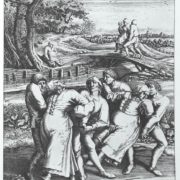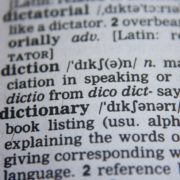A. Motion picture studios manufacture motion pictures. Motion pictures are shot from scripts. Scripts are developed from stories. Stories are written and sent to studios by policemen, judges, dentists, carpet layers, parachute jumpers, nurses, and teachers. It is a platitude that everyone owning a pencil fancies himself a writer. Consequently, all motion picture studios are flooded with a gigantic muddy river of stories. They come, and never cease coming, from all parts of the world by every known means of transmission. In addition to this volcanic avalanche of amateur paper, there is also the formidable array of professional paper. The efforts of persons who are really writers and some of them with reputations that must be respected. Billions of words are typewritten on millions of sheets of paper. Nothing can stop it.
B. Each major studio has an elaborate reading department to cope (or attempt to cope) with this illimitable ocean of story material. Pallid, neurotic, harassed and over-driven men and women called ‘‘readers’’ sit, day in and day out, in small cubicles reading the billions of words on millions of sheets of paper. Very roughly about one out of every hundredth story hopefully submitted contains some small grain of merit and must be synopsized for further consideration by some person or persons higher up in the hierarchy of the studio. The slave who reads must in turn become a slave who writes and prepares a brief outline of the story. This outline is technically known as a synopsis and is one of the principal reasons why associate producers or supervisors sprout stomach ulcers in such magnificent abundance.
C. It is a rule in most studios that the synopses must be sent to the individual supervisors for their opinion. Walk into the office of any supervisor and you’ll find his desk piled high with these cryptic documents. He is supposed to read them in his leisure time. Actually he has no leisure time because his normal day is an incessant frenzy of work on the pictures he is actually shooting and the stories he is actually preparing for production. In practice, the supervisor reads and tries to understand the synopses during office hours in the brief intervals between arguing with highly paid actors worrying about the public’s perception of the roles they will play. The supervisor would really like to jump out the window or take a protracted cruise around the world.
D. After dictating a polite note to the head of the reading department in which he questions the suitability of “Hot Lips,” he closes his eyes, reaches into the pile of synopses and pulls out a script entitled “Glamour.” This story is sometimes called “Thy Name Is Woman” or ‘“The Greater Love.” The author is one Geraldine Grush of Laramie, Wyoming, and it portrays the vicissitudes of Babette, the hottest dame in town. Men, to Babette, are just playthings. She can either toy with them or leave them alone. She chooses the former until she meets Hilary Pendergast, a tall, dark, handsome engineer just returned from designing a banana oil refinery in Peru. Hilary becomes the real love of Babette’s life. She marries him, whispers woman’s sweetest secrets into his ear and becomes a model of domestic virtue.
E. An interruption arrives in the form of a very thick and detailed synopsis accompanied by a note. The note says that this story, submitted by one of the most prosperous and successful agents in the community (and, by the way, one of the best rhumba dancers at The Trocadero) must be read immediately. Every studio in town is considering the story. “Unless we make up our minds by noon, Colossal Productions will undoubtedly buy it.” Every third synopsis is accompanied by such a note. And so, the poor, pathetic supervisor rubs his tired eyes and girds up his loins to plough through a fifty-page synopsis of “Little Darling,’ a new novel by M. Waldo Willoughby.
F. This turns out to be the saga of little Minnie Green, a yellow-haired, blue-eyed, adorable child of four whose father is an aviator. Minnie is the darling of the horny-handed but soft-hearted boys who hang around the airport. She talks baby-talk; foils the nasty man about to put maple syrup in the gas tank of her daddy’s plane just before he takes off to fly the mail through a snowstorm; makes her mother, who sniffs cocaine, realize the error of her ways; causes Erickson, a comic Swedish mechanic, to marry Tessie, a comic tough waitress working at the airport lunchroom. Minnie ends up singing a song at a birthday party given for her by the president of the Blue Bird Aircraft Co. Inc.
G. This one is what is known in the parlance of the trade as a “honey.” Our supervisor’s nerves are twitching like jumping beans by this time. He calls in his secretary, writes a note to the head of the reading department and informs him that his sole reaction after reading “Little Darling’ was a strong desire to bait a hook with the child. He then staggers out of his office en route to the men’s room. Just as he is about to enter the sanctum, he meets an agent on his way out. The agent seizes him firmly by the coat lapel, looks him straight in the eye and excitedly gasps, “Boy, have I got a great story for you. Boy, will you get a thrill—and it’ll only take you a half hour to read it.’’ The agent then vanishes, leaving the supervisor standing near the door of the men’s room clutching in his palsied hand the manuscript of ‘Don’t Sell Love Short,” a play in five acts and thirty-one scenes by Devereaux Pincus and Mary Lou Humperdink.
Questions 1-8
Choose the appropriate letters A-D
Questions 9
The writer gives examples of a number of factors that make readers and supervisors at motion picture studios follow a tight schedule. Which THREE of the following factors are illustrated? Indicate your answers (A-F)
IELTS Reading #2
Question 1 |
professional script writers
| |
any willing individuals
| |
professional actors | |
people with a high level of education and a passion for cinematic arts
|
Question 2 |
all of the choices are correct
| |
Readers work long hours and do not make final decisions | |
Readers have low self-esteem
| |
Readers receive low salaries and minimal fringe benefits
|
Question 3 |
when they are at home
| |
during breaks
| |
when they enter their offices
| |
during leisure time
|
Question 4 |
how a playgirl becomes a good wife
| |
Geraldine Grush’s adventure in town
| |
a love story of a prince and a domestic helper
| |
a detective story featuring an engineer as a killer
|
Question 5 |
He is a responsible and hard-working employee.
| |
He is deeply attracted to the plots and therefore refuses to get rest.
| |
He is encouraged by family members, who give him whatever support he needs.
| |
The decision making process is time-sensitive
|
Question 6 |
strict | |
responsible | |
authoritative | |
uninvolved |
Question 7 |
a story that needs translation
| |
a promising story
| |
a mediocre story | |
an awful story |
Question 8 |
overwhelmed | |
frustrated | |
excited | |
disappointed |
Question 9 |
each studio is only given limited time to decide whether to produce a movie using a particular story
| |
The number of stories to be considered is exceedingly high.
| |
studio owners are merciless employers who keep scolding at staff members in order to make them work fast.
| |
readers and/or supervisors are responsible for duties other than solely reading stories.
| |
the costs of running motion picture studios are high.
| |
actors demand abundant time to memorize scripts
|






Comments